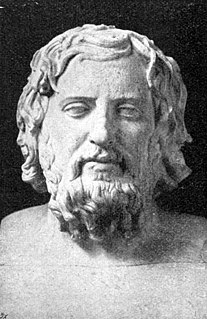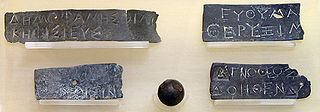
The trial of Socrates was held to determine the philosopher’s guilt of two charges: asebeia (impiety) against the pantheon of Athens, and corruption of the youth of the city-state; the accusers cited two impious acts by Socrates: “failing to acknowledge the gods that the city acknowledges” and “introducing new deities”.

Xenophon of Athens was an ancient Greek philosopher, historian, soldier, mercenary, and student of Socrates. As a soldier, Xenophon became commander of the Ten Thousand at about 30, with noted military historian Theodore Ayrault Dodge saying of him, “the centuries since have devised nothing to surpass the genius of this warrior.” He established the precedent for many logistical operations and was among the first to use flanking maneuvers, feints and attacks in depth. He was among the greatest commanders of antiquity. As a historian, Xenophon is known for recording the history of his time, the late-5th and early-4th centuries BC, in such works as the Hellenica, which covered the final seven years and the aftermath of the Peloponnesian War, thus representing a thematic continuation of Thucydides' History of the Peloponnesian War.
The Symposium is a philosophical text by Plato dated c. 385–370 BC. It depicts a friendly contest of extemporaneous speeches given by a group of notable men attending a banquet. The men include the philosopher Socrates, the general and political figure Alcibiades, and the comic playwright Aristophanes. The speeches are to be given in praise of Eros, the god of love and desire, and the son of Aphrodite. In the Symposium, Eros is recognized both as erotic love and as a phenomenon capable of inspiring courage, valor, great deeds and works, and vanquishing man's natural fear of death. It is seen as transcending its earthly origins, and attaining spiritual heights. This extraordinary elevation of the concept of love raises a question of whether some of the most extreme extents of meaning might be intended as humor or farce. Eros is almost always translated as “love”, and the English word has its own varieties and ambiguities that provide additional challenges to the effort to understand the Eros of ancient Athens.

Aristippus of Cyrene was the founder of the Cyrenaic school of Philosophy. He was a pupil of Socrates, but adopted a very different philosophical outlook, teaching that the goal of life was to seek pleasure by circumstances to oneself and by maintaining proper control over both adversity and prosperity. His outlook came to be called "ethical hedonism." Among his pupils was his daughter Arete.
Meno is a Socratic dialogue written by Plato. It appears to attempt to determine the definition of virtue, or arete, meaning virtue in general, rather than particular virtues, such as justice or temperance. The first part of the work is written in the Socratic dialectical style and Meno is reduced to confusion or aporia. In response to Meno's paradox, however, Socrates introduces positive ideas: the immortality of the soul, the theory of knowledge as recollection (anamnesis), which Socrates demonstrates by posing a mathematical puzzle to one of Meno's slaves, the method of hypothesis, and, in the final lines, the distinction between knowledge and true belief.
Crito is a dialogue by the ancient Greek philosopher Plato. It depicts a conversation between Socrates and his wealthy friend Crito regarding justice (δικαιοσύνη), injustice (ἀδικία), and the appropriate response to injustice. Socrates thinks that injustice may not be answered with injustice, and refuses Crito's offer to finance his escape from prison. The dialogue contains an ancient statement of the social contract theory of government.
The Apology of Socrates, by Plato, is the Socratic dialogue that presents the speech of legal self-defence, which Socrates presented at his trial for impiety and corruption, in 399 BC.
Gorgias is a Socratic dialogue written by Plato around 380 BC. The dialogue depicts a conversation between Socrates and a small group of sophists at a dinner gathering. Socrates debates with the sophist seeking the true definition of rhetoric, attempting to pinpoint the essence of rhetoric and unveil the flaws of the sophistic oratory popular in Athens at the time. The art of persuasion was widely considered necessary for political and legal advantage in classical Athens, and rhetoricians promoted themselves as teachers of this fundamental skill. Some, like Gorgias, were foreigners attracted to Athens because of its reputation for intellectual and cultural sophistication. In the Gorgias, Socrates argues that philosophy is an art, whereas rhetoric is a skill based on mere experience. To Socrates, most rhetoric is in practice merely flattery. To use rhetoric for good, rhetoric cannot exist alone. It must depend on philosophy to guide its morality, he argues. Socrates therefore believes that morality is not inherent in rhetoric and that without philosophy, rhetoric is simply used to persuade for personal gain. Socrates suggests that he is one of the few Athenians to practice true politics (521d).
The Apology of Socrates to the Jury, by Xenophon of Athens, is a Socratic dialogue about the legal defence that the philosopher Socrates presented at his trial for the moral corruption of Athenian youth; and for asebeia (impiety) against the pantheon of Athens; judged guilty, Socrates was sentenced to death.
The Symposium is a Socratic dialogue written by Xenophon in the late 360's B.C. In it, Socrates and a few of his companions attend a symposium hosted by Kallias for the young man Autolykos. Xenophon claims that he was present at the symposium, although this is disputed because he would have been too young to attend. The dramatic date for the Symposium is 422 B.C.
Memorabilia is a collection of Socratic dialogues by Xenophon, a student of Socrates. The lengthiest and most famous of Xenophon's Socratic writings, the Memorabilia is essentially an apologia (defense) of Socrates, differing from both Xenophon's Apology of Socrates to the Jury and Plato's Apology mainly in that the Apologies present Socrates as defending himself before the jury, whereas the former presents Xenophon's own defense of Socrates, offering edifying examples of Socrates' conversations and activities along with occasional commentary from Xenophon.
In Plato's Ion Socrates discusses with the titular character, a professional rhapsode who also lectures on Homer, the question of whether the rhapsode, a performer of poetry, gives his performance on account of his skill and knowledge or by virtue of divine possession. It is one of the shortest of Plato's dialogues.
Phaedo of Elis was a Greek philosopher. A native of Elis, he was captured in war as a boy and sold into slavery. He subsequently came into contact with Socrates at Athens who warmly received him and had him freed. He was present at the death of Socrates, and Plato named one of his dialogues Phaedo.
The Clitophon is a 4th-century BC dialogue traditionally ascribed to Plato, though the work's authenticity is debated. It is the shortest dialogue in Plato's traditional corpus. It centers on a discussion between Clitophon and Socrates, with Socrates remaining mostly silent. Most scholarship until recently has been concerned with the authenticity rather than the actual meaning and contents of Clitophon.

"I know that I know nothing" is a saying derived from Plato's account of the Greek philosopher Socrates. It is also called the Socratic paradox. The phrase is not one that Socrates himself is ever recorded as saying.

Sócrates Brasileiro Sampaio de Souza Vieira de Oliveira, MD, simply known as Sócrates, was a Brazilian footballer who played as an attacking midfielder. His medical degree and his political awareness earned him the nickname "Doctor Socrates".
Socrates Chrestus was the second son of Nicomedes III of Bithynia. He usurped the Bithynian throne by deposing his elder brother or half brother, Nicomedes IV of Bithynia.

Buridan's Bridge is described by Jean Buridan, one of the most famous and influential philosophers of the Late Middle Ages, in his book Sophismata. It is a self-referential paradox that involves a proposition pronounced about an event that might or might not happen in the future.










